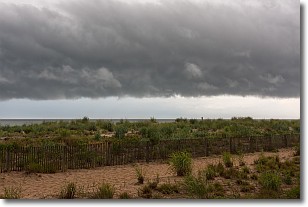Weather Alert in New Mexico
Flash Flood Warning issued June 30 at 6:40PM MDT until June 30 at 8:00PM MDT by NWS Albuquerque NM
AREAS AFFECTED: San Miguel, NM
DESCRIPTION: At 640 PM MDT, Doppler radar indicated the thunderstorms that produced heavy rain over the Hermits Peak and Calf Canyon Burn Scar diminishing. Up to 1.9 inches of rain have fallen. Additional rainfall amounts up to 0.25 inches are possible in the warned area. Flash flooding is likely ongoing. Excessive rainfall over the burn scar will impact the Tecolote Creek and Gallinas River drainage areas. The debris flow can consist of rock, mud, vegetation and other loose materials. HAZARD...Life threatening flash flooding. Thunderstorms producing flash flooding in and around the Hermits Peak and Calf Canyon Burn Scar. SOURCE...Radar indicated. IMPACT...Life threatening flash flooding of areas in and around the Hermits Peak and Calf Canyon Burn Scar. Some locations that will experience flash flooding include... El Porvenir, Montezuma, Sapello, Tierra Monte, Gallinas, Mineral Hill, Rociada, Manuelitas and San Geronimo. This includes the following highways... State Road 94 between Mile Markers 1 and 9. State Road 518 between Mile Markers 10 and 16. State Road 283 between Mile Markers 7 and 12...and near Mile Marker 14. State Road 276 between Mile Markers 0 and 5. State Road 266 between Mile Markers 0 and 6. State Road 65 between Mile Markers 1 and 14. State Road 105 between Mile Markers 0 and 6.
INSTRUCTION: This is a life threatening situation. Heavy rainfall will cause extensive and severe flash flooding of creeks, streams and ditches in the Hermits Peak and Calf Canyon Burn Scar. Severe debris flows can also be anticipated across roads. Roads and driveways may be washed away in places. If you encounter flood waters, climb to safety.
Want more detail? Get the Complete 7 Day and Night Detailed Forecast!
Current U.S. National Radar--Current
The Current National Weather Radar is shown below with a UTC Time (subtract 5 hours from UTC to get Eastern Time).

National Weather Forecast--Current
The Current National Weather Forecast and National Weather Map are shown below.

National Weather Forecast for Tomorrow
Tomorrow National Weather Forecast and Tomorrow National Weather Map are show below.

North America Water Vapor (Moisture)
This map shows recent moisture content over North America. Bright and colored areas show high moisture (ie, clouds); brown indicates very little moisture present; black indicates no moisture.

Weather Topic: What are Shelf Clouds?
Home - Education - Cloud Types - Shelf Clouds
 Next Topic: Sleet
Next Topic: Sleet
A shelf cloud is similar to a wall cloud, but forms at the front
of a storm cloud, instead of at the rear, where wall clouds form.
A shelf cloud is caused by a series of events set into motion by the advancing
storm; first, cool air settles along the ground where precipitation has just fallen.
As the cool air is brought in, the warmer air is displaced, and rises above it,
because it is less dense. When the warmer air reaches the bottom of the storm cloud,
it begins to cool again, and the resulting condensation is a visible shelf cloud.
Next Topic: Sleet
Weather Topic: What is Snow?
Home - Education - Precipitation - Snow
 Next Topic: Stratocumulus Clouds
Next Topic: Stratocumulus Clouds
Snow is precipitation taking the form of ice crystals. Each ice crystal, or snowflake,
has unique characteristics, but all of them grow in a hexagonal structure.
Snowfall can last for sustained periods of time and result in significant buildup
of snow on the ground.
On the earth's surface, snow starts out light and powdery, but as it begins to melt
it tends to become more granular, producing small bits of ice which have the consistency of
sand. After several cycles of melting and freezing, snow can become very dense
and ice-like, commonly known as snow pack.
Next Topic: Stratocumulus Clouds
Current conditions powered by WeatherAPI.com




